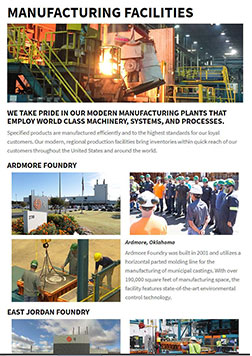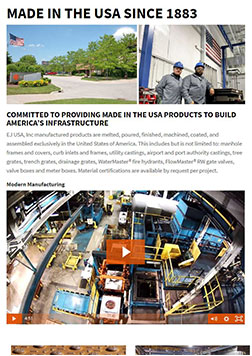Government Regulations
Relevent Regulations for Infrastructure Projects
AASHTO M306
Gray iron castings shall be manufactured from iron conforming to ASTM A48, Class 35B, as noted in section 3.1 of AASHTO M306. Ductile iron castings shall conform to ASTM A536. The iron material used in the products provided shall have a minimum recycled material content of 75%. The recycled materials shall consist of post-consumer material.
Learn more at www.transportation.org
Build America, Buy America Act (BABAA)
The IIJA of 2021 included the Build America, Buy America Act. This bill requires federal infrastructure programs to provide for the use of materials produced in the United States. The BABAA statutorily directs the application of “Buy America” domestic preference policies to federal financial assistance programs for infrastructure, both to programs not subject to any laws currently, as well as to those that are currently subject to Buy America laws that may be limited in scope to specific materials or products.
In contrast to the Buy America requirement applied to the 2009 American Recovery and Reinvestment Act, the statutory authority provided by the BABAA is not limited to the funds appropriated or authorized in the IIJA. Rather, the BABAA directs the application of Buy America laws to federal aid infrastructure programs that will have enduring, permanent impact. The BABAA would bar the award of federal financial assistance for infrastructure unless all of the iron, steel and manufactured products and construction materials (including composite and aluminum fabricated products) used in the project are produced in the United States.
Learn more at: Build America, Buy America Act
Buy America Act
A number of Buy America laws apply to various federal assistance infrastructure programs. These laws require that American-made municipal castings must be used in federally-assisted, state and local-level public works infrastructure projects that are funded or financed with federal U.S. taxpayer dollars.
As a condition for the award of federal financial assistance from these programs, states must agree to construct transportation infrastructure projects with iron, steel, and manufactured products produced in the United States. These federal-assistance Buy America laws apply to federal assistance provided by the Federal Highway Administration, Federal Transit Administration, High-Speed and Intercity Passenger Rail Program, Federal Aviation Administration, Federal Railroad Administration, and AMTRAK. This includes (but is not limited to): efforts to construct, maintain or improve roads, highways, interstates, bridges, airports, transportation infrastructure drainage systems, and utility relocations.
The municipal castings covered by these laws include: access hatches; ballast screens; benches (iron or steel); bollards; cast bases; cast iron hinged hatches, square and rectangular; cast iron riser rings; catch basin inlet; cleanout/monument boxes; construction covers and frames; curb and corner guards; curb openings; detectable warning plates; downspout shoes (boot, inlet); drainage grates, frames and curb inlets; inlets; junction boxes; lampposts; manhole covers, rings and frames, risers; meter boxes; service boxes; steel hinged hatches, square and rectangular; steel riser rings; trash receptacles; tree grates; tree guards; trench grates; and valve boxes, covers and risers.
Waivers may be obtained if applying for these requirements would be inconsistent with the public interest, iron and steel products are not available in sufficient and reasonably available quantities, or the inclusion of domestic materials would increase the cost of the overall project by more than 25 percent.
Canadian Products: Note that while the Buy America regulations of certain federal agencies now define Canadian products as domestic (with some restrictions), Canadian products are considered foreign-made under the Buy America regulations of the Departments of Transportation and Energy.
Penalties: Because the Buy America provisions of the 1991 law explicitly require that iron castings manufactured in U.S. foundries be used for federal transportation infrastructure projects, knowing country of origin is particularly important for purchasing officials who procure iron products for such projects. If a contractor violates the law by using foreign products, the normal remedy is to penalize the contractor by reducing the contract price by an amount equal to the difference between the cost of the foreign material provided and the cost of similar domestic materials. A contractor who falsely certifies that U.S.-made products will be provided may also incur civil penalties under the False Claims Act. Severe penalties exist for a government contractor or subcontractor who deceptively affixes a "Made in the USA" label or intentionally misrepresents the country of origin of a product to be used in a federal highway project. These penalties include placement on the "List of Parties Excluded from Procurement Program" that is circulated to all federal agencies. Moreover, the offending party may be subject to further civil and criminal penalties of up to $5,000 and/or imprisonment for one year per violation. A construction contractor who fails to comply with the Buy America provisions will be prohibited from receiving any further construction contracts from any federal government agency for a three- year period. The three-year ban also applies to subcontractors or suppliers associated with the contractor.
Learn more at Buy America Act 49 CFR 661, published 10/1/2012
Federal Aviation Administration: Buy America Preference Requirements: 49 U.S.C. 50101
Federal Highway Administration: Buy America Policies, 23 U.S.C. 313, and 23 CFR 635.410
Federal Transportation Administration: Buy America Policies, 49 U.S.C. 5323(j), and 49 CFR 661.3
Buy American Act
The Buy American Act was passed in 1933 by congress and signed by President Hoover. The act required the United States Government to prefer U.S.-made products in its purchases. The Buy American Act applies to all U.S. federal government agency purchases of goods valued over the micro purchase threshold, but does not apply to services. Under the Act, all goods for public use (construction articles, materials, or supplies) must be produced in the U.S., and manufactured items must be manufactured in the U.S. from "substantially all" U.S. materials.
Learn more at Buy American 41 U.S.C. 83, published 1/3/2012
Country-of-Origin Marking Requirements
Imported castings are subject to specific country-of-origin markings in order to legally enter the United States. You should be aware of the Federal country-of-origin marking law and should know that you have the responsibility to play your part in complying with the law.
The U.S. country of origin markings statute, Section 304 of the Tariff Act of 1930, 19 U.S.C. § 1304, et seq., requires that every article of foreign origin entering into the United States must be legibly marked with the English name of the country of origin unless otherwise excepted under the law. 19 U.S.C. § 1304. The markings must be “in a conspicuous place as legibly, indelibly, and permanently as the nature of the article (or container) will permit,” in a manner that indicates to the “ultimate purchaser” in the United States the English name of the country of origin of the article. Id. The “ultimate purchaser” is defined by U.S. Customs’ regulations, 19 C.F.R. § 134.1(d), to be the last person in the United States who will receive the article in the form in which it was imported.
The Country of Origin Markings statute requires the country of origin markings be legible, indelible, and permanent. U.S. Customs’ regulations clarify this requirement, stating that the markings requirements are best met by markings “worked into the article” at the time of manufacture. 19 C.F.R. § 134.41. U.S. Customs’ regulations go on to provide that in the case of “metal articles,” the recommended method of marking is by die sinking, cast-in-mold lettering, or etching.
There is a special statutory marking law for manhole rings or frames, covers, and assemblies thereof. That provision states that these products must be “marked on the top surface with the English name of the country of origin by means of die stamping, cast-in-mold lettering, etching, engraving, or an equally permanent method of marking.” Congress created this special marking requirement for manhole rings or frames, covers, and assemblies thereof because the country-of-origin marking law was being evaded significantly by such practices as placing the country-of-origin marking on areas of the casting that would be embedded in concrete or otherwise obscured from view. A significant factor in Congress’ decision to mandate top-side marking was its recognition that members of the public are the purchasers and users of these items – and so the country-of-origin marking should be where the public can easily see it.
Learn more at MCA Country of Origin Marking Requirements
EPA American Iron and Steel (AIS) Provision
This provision requires Clean Water State Revolving Fund (CWSRF) and Drinking Water State Revolving Fund (DWSRF) assistance recipients to use domestic iron and steel. This requirement applies to construction, alteration, maintenance, or repair of a public water system or treatment works.
Learn more at: EPA American Iron and Steel (AIS) Requirement
Infrastructure Investment and Jobs Act (IIJA)
The Infrastructure Investment and Jobs Act is a $1.2 trillion United States federal statute signed into law by President Joe Biden in 2021. The bill included $550 billion in new spending on infrastructure over the next five years and included provisions related to federal-aid highway, transit, highway safety, motor carrier, research, hazardous materials and rail programs of the Department of Transportation.
Learn more at: Infrastructure Investment and Jobs Act 2021



